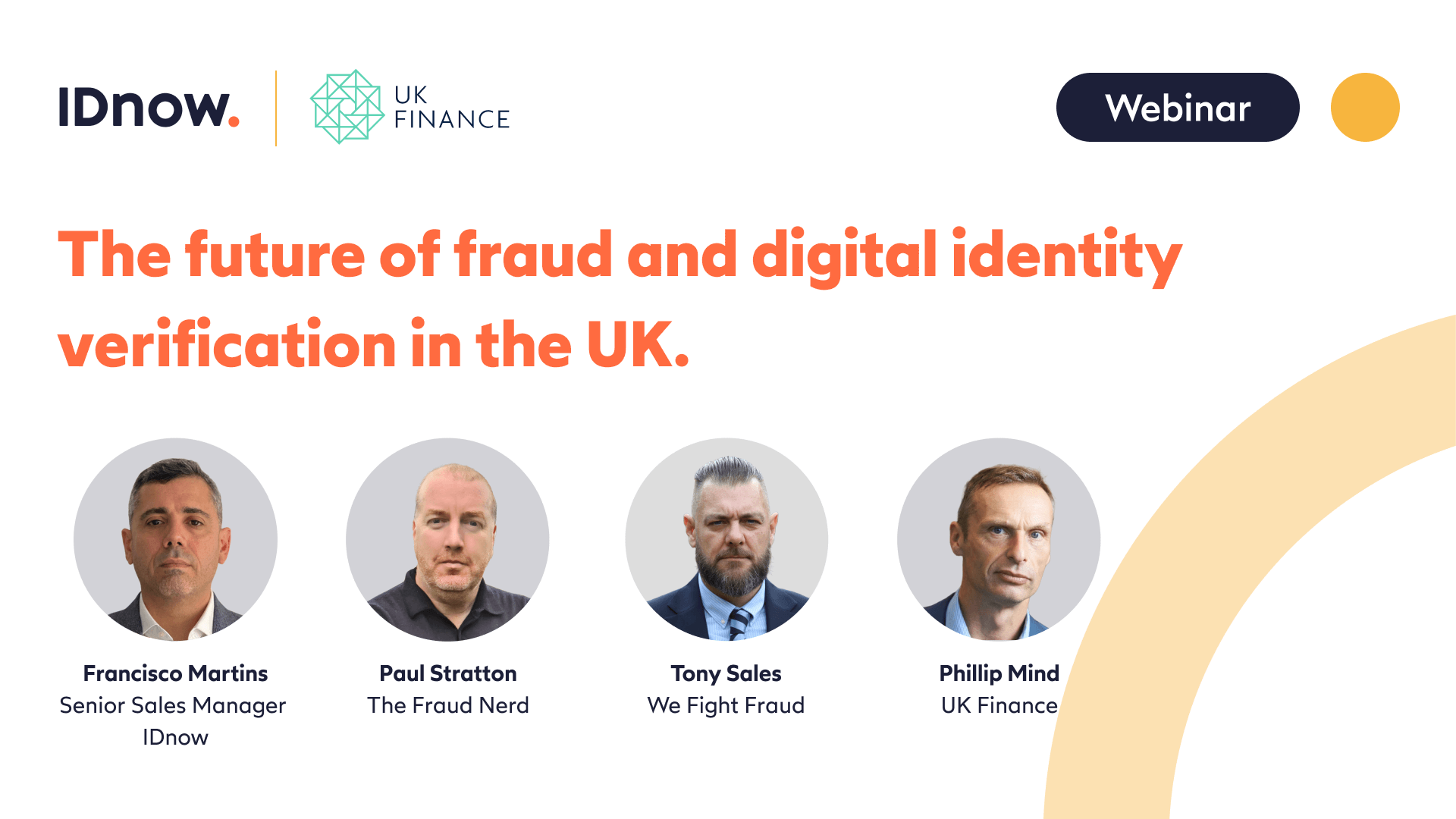In IDnow’s latest webinar, experts gathered to discuss the challenges of preventing fraud, and the crucial role of identity verification services in the fraud capital of Europe.
If we are ever to tackle the scourge of fraud in the UK (which currently claims the dubious honor of being fraud capital of Europe), then more must be done to educate the public of the real harm, according to participants of IDnow’s recent webinar, ‘The future of fraud and identity verification in the UK.’
The panel discussion, which is available now on-demand, gathered an eclectic bunch of experts, including Philipp Mind, Director Digital Technology and Innovation at UK Finance, Francisco Martins, Regional Senior Sales Manager at IDnow, Tony Sales, ex-fraudster and current Chief Product Officer at We Fight Fraud, and Paul Stratton, ex-police officer and current Founder and Lead Trainer at The Fraud Nerd.
Philipp, who was the moderator for the session, started by setting the scene, which included sharing some startling statistics of just how dire the problem of fraud is in the UK. (Read more about the UK’s problem with fraud here.)
It then seemed only fitting to begin by speaking with the once dubbed “Britain’s greatest fraud star” to give his opinion on the state of fraud.
“Criminals have now got more tools and data streams available to them than ever before. When I was a criminal, getting someone’s information was quite difficult, it wasn’t the process that it is now with Telegram, and the dark web, and all these places where criminals can harvest information, so it’s a lot easier to commit than it ever was before.”
Tony added that the cost-of-living crisis has a part to play in people committing fraud, as does the role of social media in creating unobtainable lifestyles that persuade people to “get involved in deetsing [acquiring funds from account details].
They don’t even realize the consequences of their actions. They just want to get that item that they see others have. I think that’s a massive part of why we see the numbers [of fraud] we do nowadays.
Tony Sales, ex-fraudster and current Chief Product Officer at We Fight Fraud
Paul, who has been historically at the opposite end of the interview table throughout his career, agreed with Tony, but also added that it was the ‘white collar’ perception of fraud that had a damaging impact on its prevalence, and often had the police deprioritize investigations.
“Fraud is still seen as just a business crime by a lot of senior officers, but fraud is also about the emotional harm as well as the financial crime. However, some police divisions like Merseyside Police [where Paul worked] are moving away from solely focusing on the financial harm.”
Paul believes that it is this perception, or misperception, that is key, citing how police divisions will invariably prioritize more ‘serious’ crimes like burglaries or murders, for example, as the harm is clear, and the public outrage if such crimes weren’t investigated, would be massive. Paul did say that times were slowly changing, though, and that the days of police fraud teams only taking on fraud cases if over a million pounds had been lost, are (in most areas) coming to an end…
As a police force, and a society, if we can move toward acknowledging the actual harm that fraud causes, and not just see the financial element, then I think that will make a big difference.
Paul Stratton, ex-police officer and current Founder and Lead Trainer at The Fraud Nerd
For insights into what steps the UK government and technology companies should be taking to stop fraud, read my interview ‘Mind the education gap? Investigating the limitations of the UK’s fraud strategy, with ex-police officer, Paul Stratton.’
The effect of KYC: A blessing and a curse.
It’s clear that technology and especially AI has facilitated an increase in new types of fraud (eg: deepfakes) in the UK. Thankfully, other types of technology like digital identity verification and eKYC were helping massively in the fight against fraud. However, while it’s important to be aware of new fraud trends, it’s also important to not forget the basics. For many organizations that means ensuring they have a robust and comprehensive KYC (Know Your Customer) process. For Tony, however, that acronym means something completely different.
“We do it differently at We Fight Fraud; we call it Know Your Criminal. From a criminal’s perspective, if an organization does have a thorough KYC process in place, then they will often abandon the onboarding, and just go to a company that doesn’t have such a robust KYC process.”
However, companies that comply with the bare minimum of KYC and AML requirements (in order to onboard customers quicker or offer a more attractive customer experience) are not only putting their business at risk, but also their customers.
“There’s some great technology out there, especially in some of the banking apps, such as liveness scan functionality. When it’s configured correctly and working as part of comprehensive process, it’s great, but sometimes the drive to onboard customers means some businesses skip steps,” explains Tony.
“A few years ago, we (We Fight Fraud) tested some organizations’ onboarding processes, and I was able to onboard my face with my colleague’s ID, and then we reversed it and used my ID document with her face. We even tried and succeeded wearing a bright yellow balaclava and were able to onboard with all three accounts, and deposit and withdraw money. It was a really easy process because the process hadn’t been configured properly or the liveness check wasn’t working in the way it should have been, and everyone’s worried about deepfakes! Let me make it clear, this was not IDnow!”
Biometrics, as Tony said, is very important. Identity verification vendors need to ensure the same face cannot be onboarded twice and the same document cannot be onboarded with another face, and most identity verification vendors cannot do that. You need risk analysis. You need heavy checks, what we call document and selfie checks, but it needs to be a holistic approach.
Francisco Martins, Regional Senior Sales Manager at IDnow
Other topics discussed during the hour-long webinar include:
- The potential of EIDAS 2.0
- Data sharing restrictions and opportunities
- The role of reusable identity
- The importance of choosing Digital Identity and Attributes Trust Framework-certified identity verification provider.
- Discover all about the rise of social media fraud, and how one man almost lost a million euros to a pig butchering scam, involving NFTS and crypto in our blog, ‘The rise of social media fraud: How one man almost lost it all.’
The future of fraud and digital identity verification in the UK [Webinar]

By

Jody Houton
Senior Content Manager at IDnow
Connect with Jody on LinkedIn



